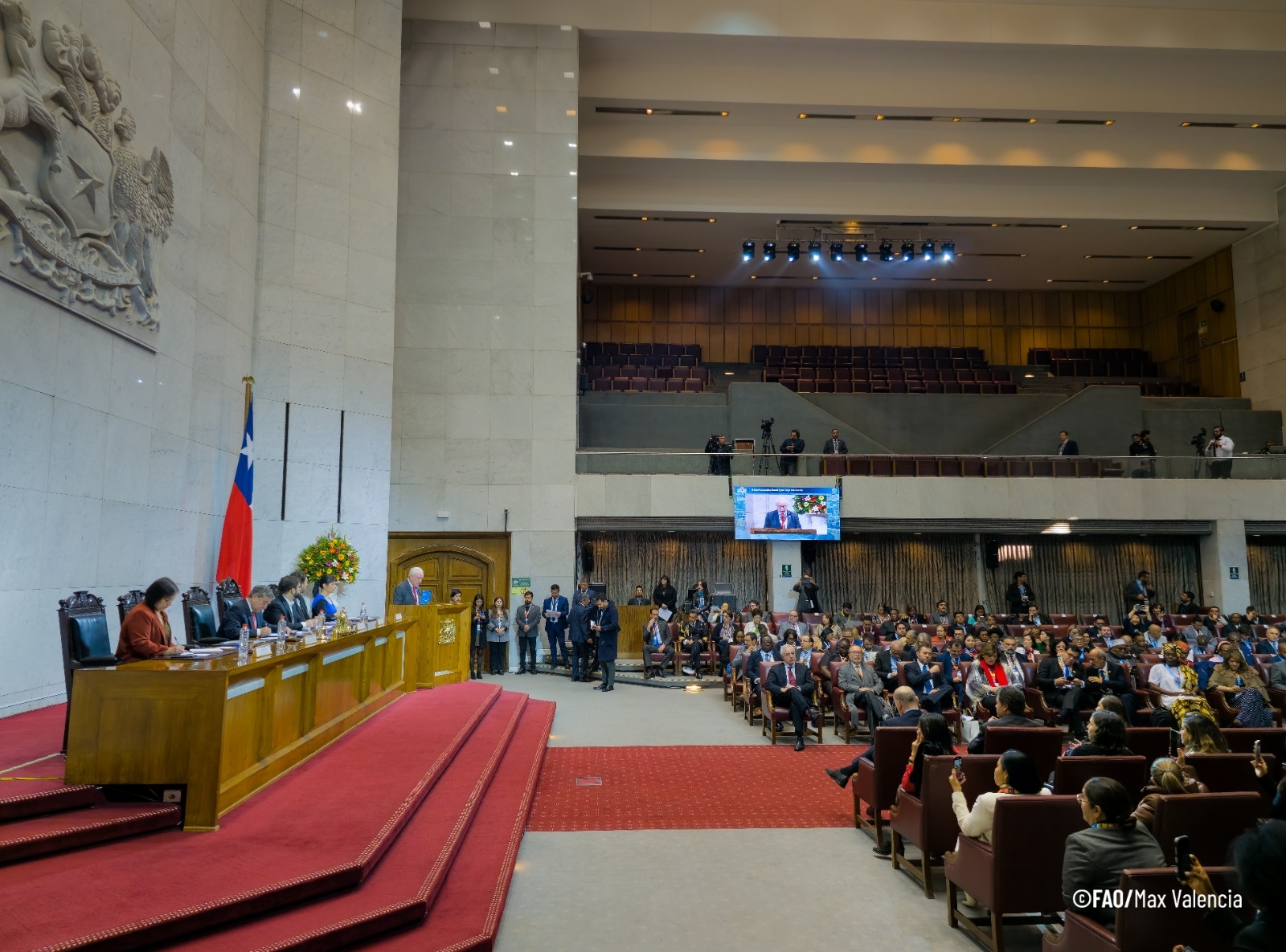May 18, 2025 | 07:48 GMT +7
May 18, 2025 | 07:48 GMT +7
Hotline: 0913.378.918
May 18, 2025 | 07:48 GMT +7
Hotline: 0913.378.918

FAO’s Regional Representative in Latin America and the Caribbean, Mario Lubetkin, delivers a speech on behalf of Director-General QU Dongyu during the opening ceremony of the II Global Parliamentary Summit against Hunger and Malnutrition in Valparaiso, Chile.
The Second Global Parliamentary Summit against Hunger and Malnutrition opened this Thursday in Chile with a strong call for an agreement among parliaments around the world to move towards making food security a reality for all.
The Summit is organized by the Food and Agriculture Organization of the United Nations (FAO), together with the Spanish Agency for International Development Cooperation (AECID), the National Congress of Chile and the Government of Chile, with the support of the European Commission, the Mexican Agency for International Development Cooperation (AMEXCID) and the Parliamentary Front against Hunger in Latin America and the Caribbean.
The two-day meeting, held at the headquarters of the National Congress in Valparaíso, has called together over 150 parliamentarians to share their experiences implementing legislation on matters related to food and nutrition security, discuss needs and priorities to address the challenges associated with hunger and malnutrition, and evaluate cooperation opportunities.
The Summit will promote formal voluntary commitments via networks of parliamentarians based on a Global Parliamentary Pact, to be launched by the end of the meeting on Friday, which includes periodic monitoring and follow-up on legislative outcomes and achievements.
‘’You have an important role to play in the transformation of global agrifood systems, to make them more efficient, more inclusive, more resilient and more sustainable,’’ FAO Director-General, QU Dongyu, told parliamentarians during the inauguration ceremony, in a speech delivered by FAO’s Regional Representative in Latin America and the Caribbean, Mario Lubetkin.
The opening ceremony had the participation of the President of the host country Chile, Gabriel Boric, who expressed the nation’s strong commitment to ending hunger and malnutrition.
‘’No effort is minor or secondary in the fight against hunger and the pursuit of food security and sustainable agriculture, as established in the second of the Sustainable Development Goals of the 2030 Agenda’’, he highlighted, recognizing the importance of promoting cooperation among parliamentarians.
Other key participants included Senator Juan Antonio Coloma, President of the Chilean Senate; Vlado Mirosevic, President of the House of Representatives of Chile; Carolina Marzán, Deputy President of the Parliamentary Front against Hunger in Chile; and Senator Carmen Gloria Aravena, Member of the Parliamentary Front against Hunger and Malnutrition.
A call for action
The FAO Director-General reminded the parliamentarians that five years ago, during the First Summit in Madrid, they committed themselves to monitoring and evaluating progress in their legislative work in the fight against hunger and malnutrition.
“Today…you meet to reaffirm these commitments, evaluate new forms of cooperation and identify innovative solutions to address the challenges that world hunger continues to pose, now more than ever,” he highlighted, explaining that as representatives of millions of citizens, parliamentarians have the great responsibility to propose, design and strengthen laws and policies that promote the right to food for all people, as well as sustainable and inclusive production systems.
Qu outlined how in recent years a situation driven by conflicts, climate threats, the pandemic and economic slowdown has put the development of nations at risk and caused a dramatic increase in hunger figures.
He added that an increase in consumer food prices has also affected the number of people who cannot access a healthy diet – now reaching 3.1 billion; child malnutrition continues to be a concern, including obesity and overweight; and women are still bearing the brunt of food insecurity, in even higher numbers since the COVID-19 pandemic.
“Against this backdrop and at the midpoint of the deadline for achieving the 2030 Agenda, the call to redouble efforts to meet the international goals – in particular Sustainable Development Goal 2 for the eradication of hunger – demands the firm and effective participation of each one of us,” the Director-General underscored, adding that the current challenges facing humanity “compel us to take urgent and effective action.”
For Qu, parliamentarians are and will continue to be actors of change, and through their functions, they can guide, sensitize and mobilize societies to work together, by encouraging citizen participation and listening to people's concerns and proposals.
“With your participation in this Summit, you demonstrate once again your commitment and readiness to place food security and nutrition as a priority in national policy and legislative agendas, defending the specific contexts and needs of your countries,’’ he expressed, affirming FAO’s readiness to continue to provide professional and technical assistance to support advancing the global goals to end hunger and achieving the Four Betters – better production, better nutrition, a better environment and better life.
“It is in our hands to reach agreements to move towards a more just, peaceful, and prosperous world for present and future generations,” the FAO Director-General urged.
(FAO.org)

(VAN) Fourth most important food crop in peril as Latin America and Caribbean suffer from slow-onset climate disaster.

(VAN) Shifting market dynamics and the noise around new legislation has propelled Trouw Nutrition’s research around early life nutrition in poultry. Today, it continues to be a key area of research.

(VAN) India is concerned about its food security and the livelihoods of its farmers if more US food imports are allowed.

(VAN) FAO's Director-General emphasises the need to work together to transform agrifood systems.

(VAN) Europe is facing its worst outbreak of foot-and-mouth since the start of the century.

(VAN) The central authorities, in early April, released a 10-year plan for rural vitalization.

(VAN) Viterra marked a significant milestone in its carbon measurement program in Argentina, called Ígaris, reaching 1 million soybean hectares measured.